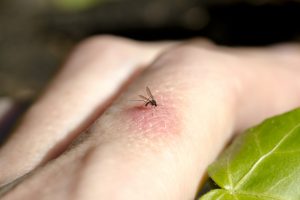 Zika virus cases in Florida have exceeded 100, new cases have been reported in New York City, so mosquito bite prevention is critical to stop the spread. So far the Centers for Disease Control and Prevention has reported 591 travel-associated cases of Zika virus in the U.S., with 121 in Florida and 127 in New York. There are no reports of locally-acquired Zika virus, meaning the American mosquitoes are not transmitting the virus, but new reports suggest that the Zika-infected mosquitoes may make their way to the southern states.
Zika virus cases in Florida have exceeded 100, new cases have been reported in New York City, so mosquito bite prevention is critical to stop the spread. So far the Centers for Disease Control and Prevention has reported 591 travel-associated cases of Zika virus in the U.S., with 121 in Florida and 127 in New York. There are no reports of locally-acquired Zika virus, meaning the American mosquitoes are not transmitting the virus, but new reports suggest that the Zika-infected mosquitoes may make their way to the southern states.
Four new Zika cases in Florida raising the statewide total above 100
Florida health officials have confirmed four new Zika virus cases, raising their total to 154 cases, which include 36 pregnant women. Florida is entering its rainy season, which could increase the risk of Aedes aegypti and aedes albopictus mosquitoes, the types of mosquitoes that transmit Zika virus.
Advertisement
Also, with the upcoming Brazil Olympic Games, international travel is on the rise, which can increase the number of infected people, thus bringing more cases into the U.S.
There is currently no vaccine against Zika virus, so mosquito bite prevention is the only method to reduce the risk of contracting Zika.
Here is a detailed chart of Zika virus cases across Florida as provided by the Florida Health Department.
| County | Number of Cases |
|---|---|
| Alachua | 4 |
| Brevard | 3 |
| Broward | 17 |
| Clay | 2 |
| Collier | 1 |
| Hillsborough | 3 |
| Lee | 4 |
| Martin | 1 |
| Miami-Dade | 46 |
| Orange | 9 |
| Osceola | 5 |
| Palm Beach | 7 |
| Pasco | 1 |
| Pinellas | 4 |
| Polk | 3 |
| Santa Rosa | 1 |
| Seminole | 3 |
| St. Johns | 2 |
| Volusia | 2 |
| Total cases (excluding pregnant women) | 118 |
| Cases of pregnant women regardless of symptoms* | 36 |
|---|
Zika virus infects pregnant women in NYC
Eight-six New Yorkers have been confirmed with Zika virus, including 14 pregnant women. So far all patients have recovered, but it is unknown whether any impending birth defects may arise. Spokeswoman Carolina Rodriquez said, “We closely monitor pregnant women through the duration of their pregnancy.”
So far, cases of Zika virus in NYC have come from individuals visiting Zika-infested countries, primarily central and south America.
A state Health Department official added, “The Zika virus is a disease of significant public health concern, with the greatest concern being the risk to the exposed fetus.”
Avoid mosquito bites to prevent Zika
If you are planning on being outdoors, oils and scents have been shown to keep mosquitoes away. Whether you use candles or sprays, they can help reduce your risk. If you have sensitive skin, taking antihistamines days prior to being outdoors along with using a spray can reduce swelling and reaction to the bite.
Another easy way to minimize your risk of bites is to avoid certain locations. Woody, grassy, wet, and steamy areas attract more mosquitoes. Avoid traveling – or setting up a picnic – in these environments.
Some natural remedies to ease the itch are to apply lotions and creams or non-prescription hydrocortisone cream. Furthermore, a paste made with baking soda and water can help relieve the itchiness as well. Applying cool compresses to bites can reduce itching and, of course, if the reaction is more severe, antihistamines can reduce the reaction.
Lastly, if you have been bitten, do not scratch! It may be tempting, and you may think you’re getting some relief, but scratching will only cause more harm than good. Instead, opt for an over-the-counter after-bite solution or other natural soothing remedy.
Related Reading:
Mosquito bite risk prevented with simple home remedies
Have you ever caught yourself itching all over due to mosquito bites while your friend right next to you is enjoying the outdoors without a single bite? It may seem completely unfair that you’re some kind of mosquito magnet, while others barely need a bug spray. Well, the two main factors that attract a mosquito are smell and sight. Continue reading…
Advertisement
Zika virus causes vision problems in babies
Zika virus has now been linked to vision problems in babies. Zika virus is already associated with microcephaly, which is a birth defect that causes abnormally small heads and brains in babies. Research has found that one-third of Brazilian babies with microcephaly also have vision problems as well, including ocular lesions, optic nerve abnormalities, and chorioretinal atrophy. Continue reading…
Sources:
http://www.miamiherald.com/news/health-care/article79917292.html
http://nypost.com/2016/05/22/zika-virus-infects-dozens-of-pregnant-women-in-nyc/
//www.belmarrahealth.com/mosquito-bite-risk-prevented-with-simple-home-remedies/
